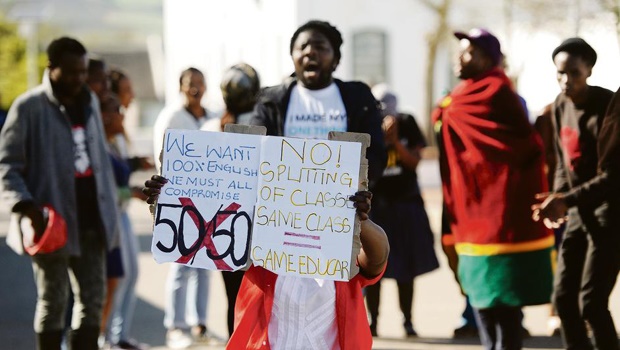Last week Professor Wim de Villiers, rector and vice-chancellor of Stellenbosch University, leapt into the right side of SA history when he announced bold plans to make English the main medium of instruction at the university.
The long-overdue decision, which has been hailed by many sections of society as a step in the right direction, is likely to have been inspired by the pressure group Open Stellenbosch.
Whether by design or by
default, it is a decision that will give De Villiers a special place in the
history of the struggle for access to higher education for the historically
disadvantaged. However, not everyone is happy with the decision. Here’s what
commentators had to say:
AGAINST
The FW de Klerk Foundation
The foundation has taken note, with shock and disappointment, of the letter and annexure of Professor Wim de Villiers to the senate of the University of Stellenbosch.
The letter makes it clear that if the rector’s proposals are approved by the university council on November 30, Afrikaans will no longer have an equal position with English at Stellenbosch University.
So, after being assured only a few years ago that Afrikaans would be the default language, and after assurances last year that the language would enjoy equal status with English, it now appears that Afrikaans is, for all practical purposes, on its way out as a language of tuition.
Under these circumstances, we must ask what confidence we can place on any assurances by the university administration.
The administration has evidently bowed to the demands of the Open Stellenbosch movement – an organisation that apparently has a core membership of fewer than 50 people.
It is incomprehensible that the university administration should so easily have swept aside the reasonable interests, concerns and rights of Afrikaans-speaking students on the entirely unconstitutional grounds that English is now the only acceptable language of access to education.
Alana Bailey, deputy CEO of AfriForum
The Stellenbosch University statement is a testimony of extreme ideological obligingness or serious ignorance, seeing as reference is made to ‘best language policy practices’ that are allegedly emulated.
The statement makes it clear the Stellenbosch University management cannot even be trusted to maintain the partial presentation, but wants to make an effort to further marginalise Afrikaans and discriminate even more drastically against Afrikaans-speaking students.
It disappoints that the university management is acting vigorously in reaction to Open Stellenbosch’s unfounded allegations, but is disregarding the best interests of basically half of the province’s residents, and is not even interested in conversing with mainstream student institutions that are advocating Afrikaans education, even excluding them from the arguments.
Last week Professor Wim de Villiers, rector and vice-chancellor of Stellenbosch University, leapt into the right side of SA history when he announced bold plans to make English the main medium of instruction at the university. The long-overdue decision, which has been hailed by many sections of society as a step in the right direction, is likely to have been inspired by the pressure group Open Stellenbosch.
Whether by design or by default, it is a decision that will give De Villiers a special place in the history of the struggle for access to higher education for the historically disadvantaged. However, not everyone is happy with the decision. Here’s what commentators had to say:
FOR
220 Stellenbosch academics supportproposals
We support the proposal by the rector’s management team on November 12 2015 with regard to the use of language at Stellenbosch University.
The choice of English as a primary language of instruction with augmented support for Afrikaans and isiXhosa is based on the principles of social justice and inclusivity. This decision will provide the university with the opportunity to become a truly South African one that is open and accessible to students and staff from our country, other parts of the rest of Africa and beyond.
The proposed new language policy is motivated by a concern to open access to Stellenbosch University to students from a range of social backgrounds and to make sure they are not marginalised when they come here. This concern has been given prominence by students and staff in meetings and during protests, and we applaud senior management for taking these seriously.
We are very concerned by talk of a backlash against these proposals, which is an attempt to retain Afrikaans as the primary language of academic communication and instruction. In effect, this celebrates the “exclusivity” of Afrikaans and closes the door on the university’s ability to embrace different people from a range of cultures and language groups.
Developing an inclusive and shared institutional ethos based on equal worth, dignity and respect will establish our university as a welcoming place for students, academics and workers.
It is in this light that we, as concerned academics and professional support services staff, declare that we support the proposals of the rector’s management team to adopt a language policy that will enable the university to establish itself as a truly inclusive South African university, a welcoming and culturally inclusive place of academic study for people from all walks of life.
Stone Sizani, ANC chief whip
We welcome this important change to the controversial language policy as a step in the right direction.
It is important to us that such a change is happening at Stellenbosch University, which has for years been regarded as an enclave of white Afrikaner nationalism, where racial discrimination, exclusionary policies and resistance to transformation [are the norm].




 Publications
Publications
 Partners
Partners









